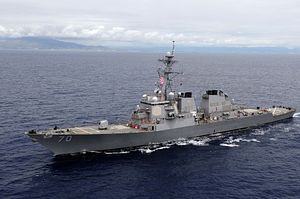On January 17, USS Hopper, a U.S. Navy Arleigh Burke-class guided missile destroyer, carried out a freedom of navigation operation (FONOP) within 12 nautical miles of Scarborough Shoal in the South China Sea.
USS Hopper‘s exercise was first publicized by the Chinese Ministry of Foreign Affairs and is the first known freedom of navigation by the U.S. Navy in the South China Sea in 2018. The operation is the first publicly revealed FONOP since USS Chafee conducted an operation within 12 nautical miles of China-held features in the Paracel Islands.
According to the Chinese Ministry of Foreign Affairs spokesperson Lu Kang, “The Chinese Navy carried out identification and verification procedures in accordance with law and warned the U.S. vessel to leave.”
“What the US vessel did violated China’s sovereignty and security interests, put the safety of Chinese vessels and personnel who were in the relevant waters for official duties under grave threat, and contravened the basic norms for international relations,” Lu added.
The Trump administration has accelerated the pace of FONOPs in the South China Sea since an initial FONOP in May 2017. In 2017, the United States Navy carried out four FONOPs in five months that were publicly reported.
Other operations may have taken place, but reports have yet to leak to the press or be announced by the U.S. Department of Defense (DoD). DoD will release its 2017 report on freedom of navigation in the first half of 2018, which will outline the scope of FONOPs around the world, but will likely not include a tally of specific operations.
Last week’s operation near Scarborough Shoal is the first known U.S. FONOP near that feature, which China seized from the Philippines in 2012 and has held since. U.S. FONOPs do not challenge the sovereignty of disputed features, which the United States takes no position on, but do challenge excessive maritime claims.
In addition challenging excessive Chinese maritime claims in the South China Sea, the U.S. Navy has conducted operations near features held by other South China Sea claimants, including Malaysia, the Philippines, Vietnam, Brunei, and Taiwan.
One of the more commonly challenged excessive maritime claims in the South China Sea that has featured prominently across multiple U.S. FONOPs is a prior notification requirement for innocent passage. Under the United Nations Convention on the Law of the Sea, which the United States has not ratified but treats as customary international law, military vessels are permitted to exercise innocent passage in a territorial sea.

































